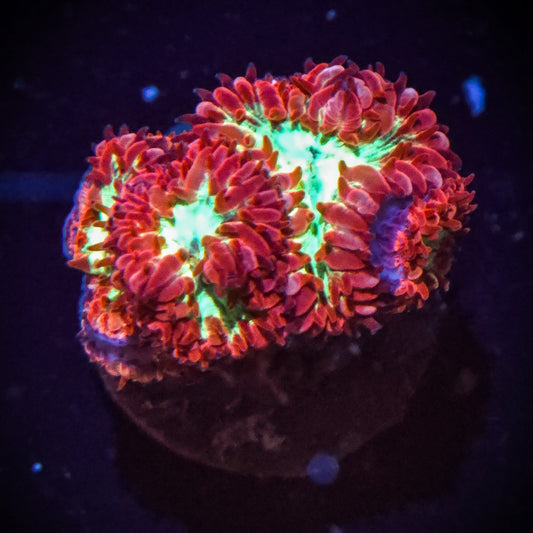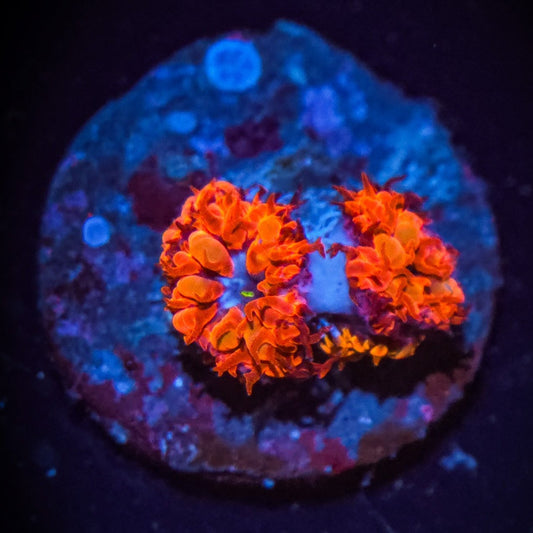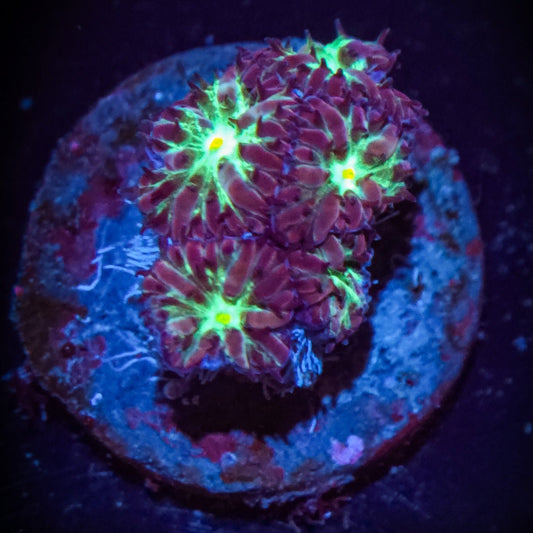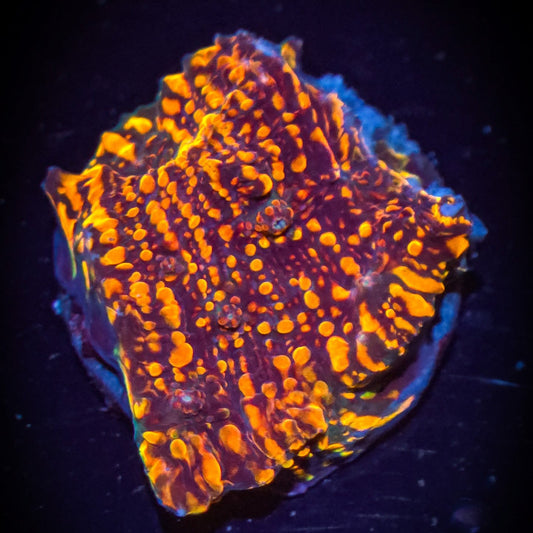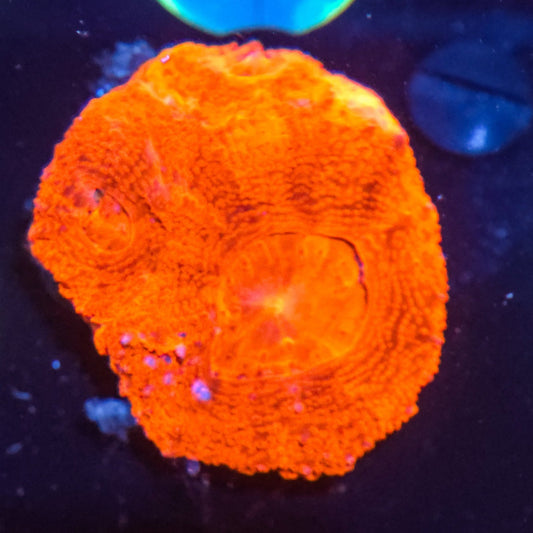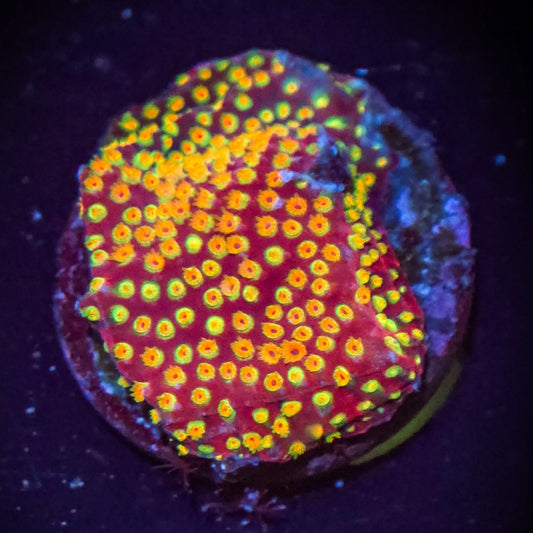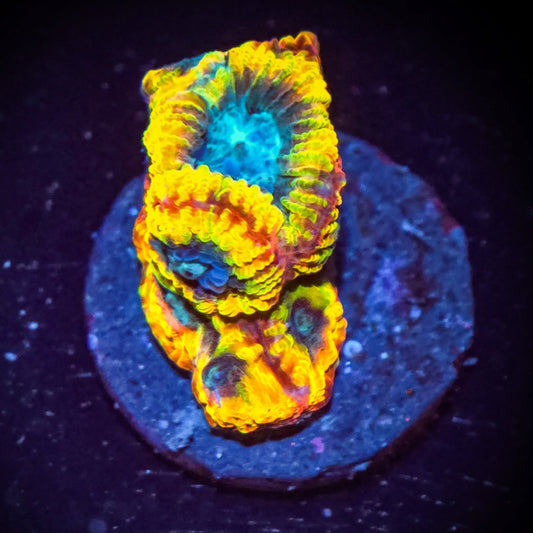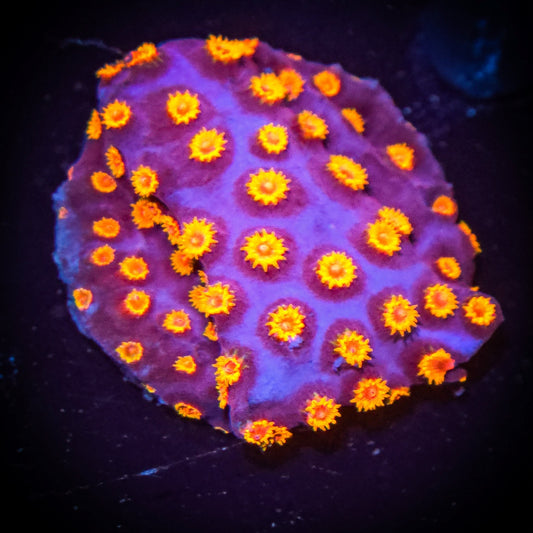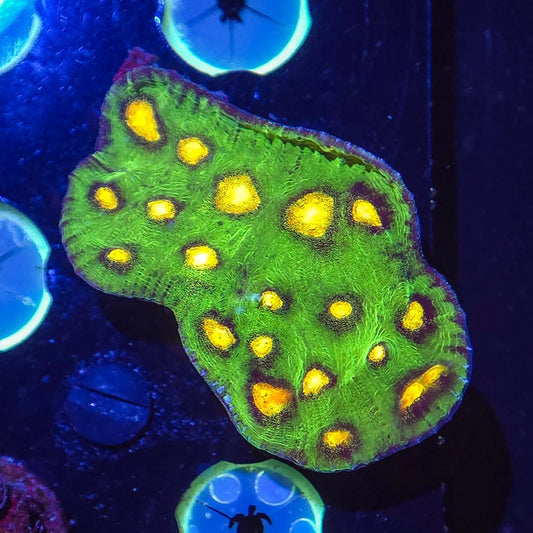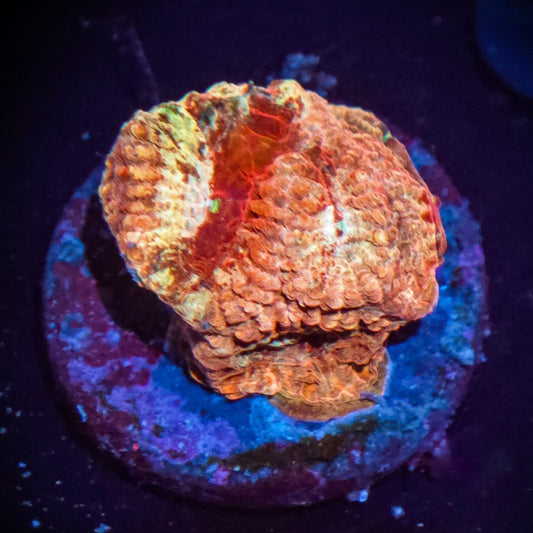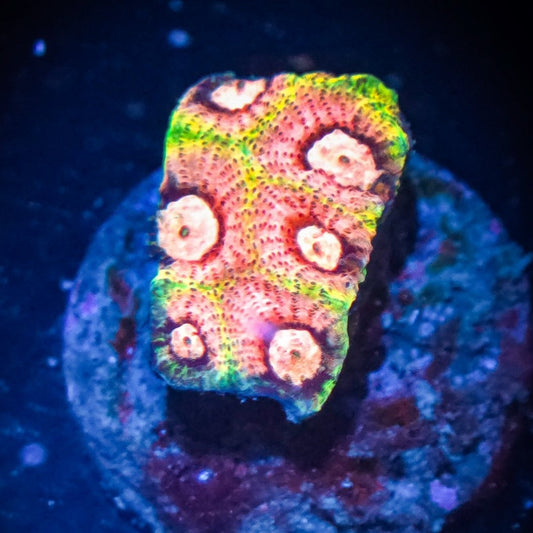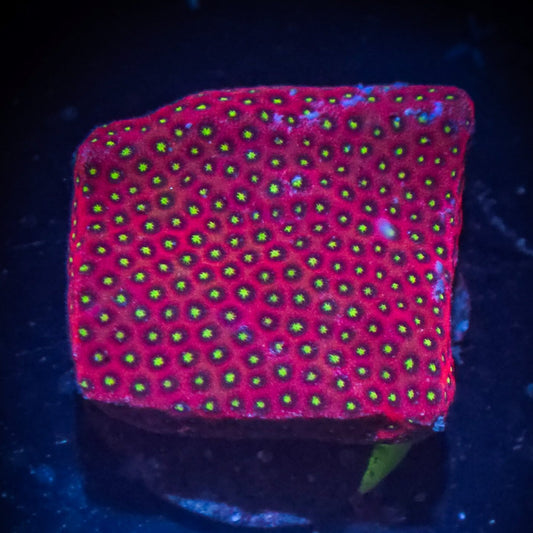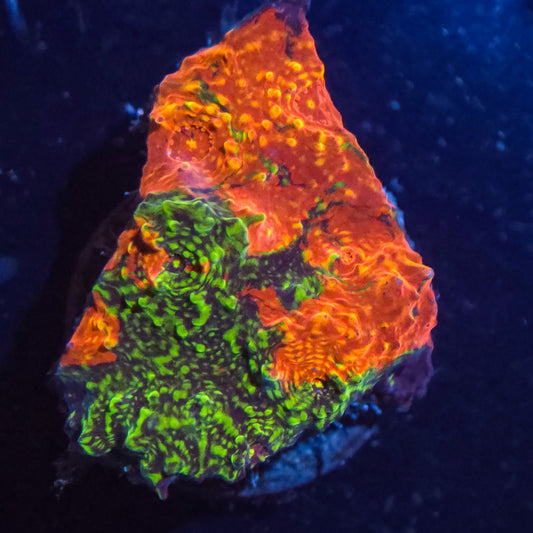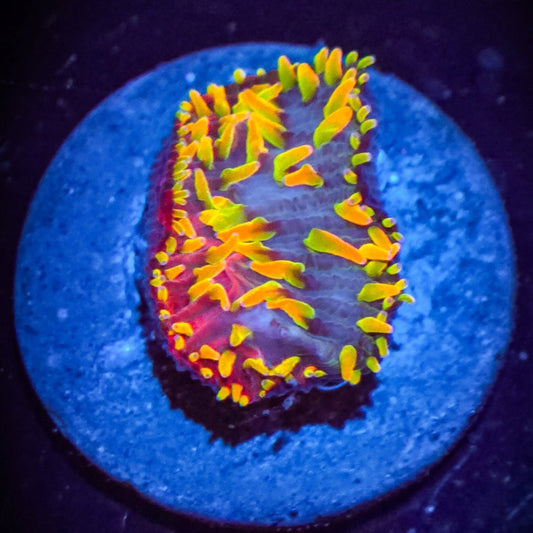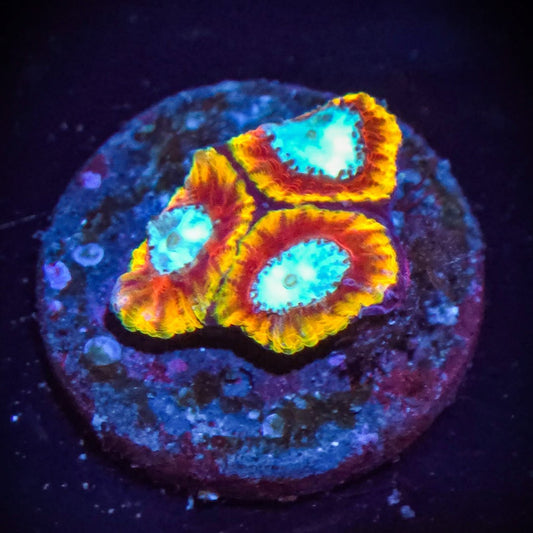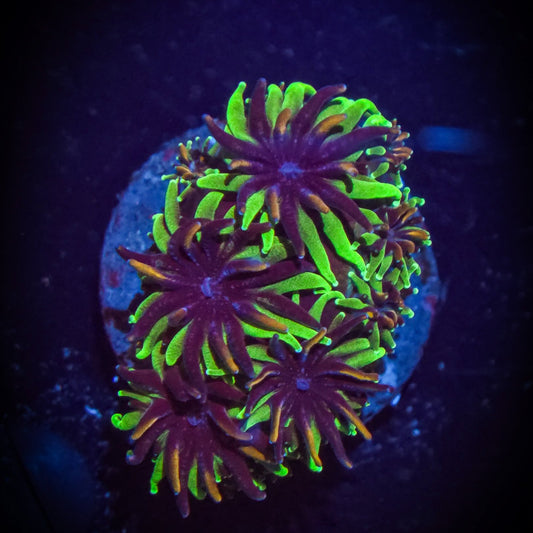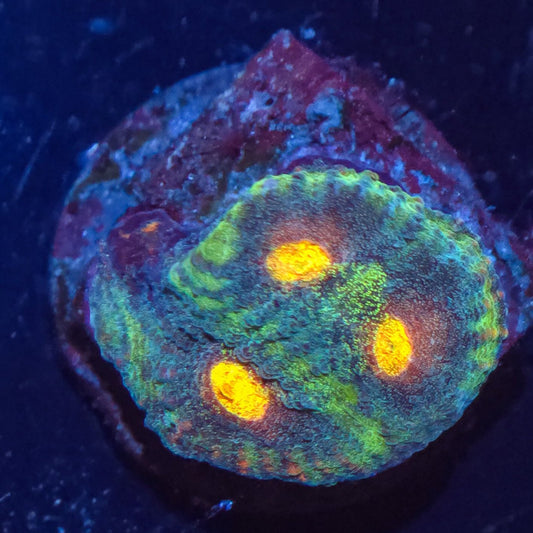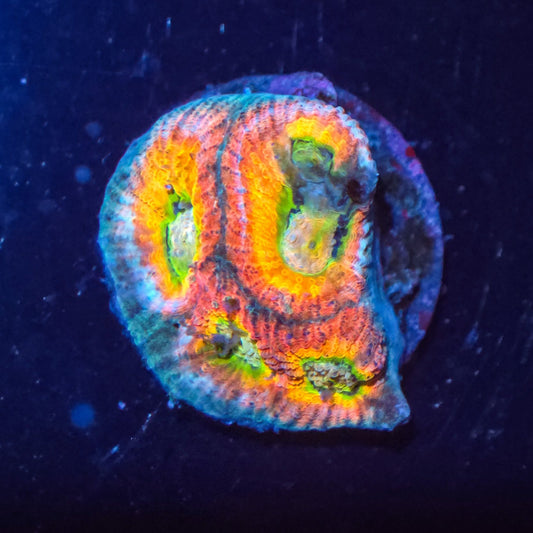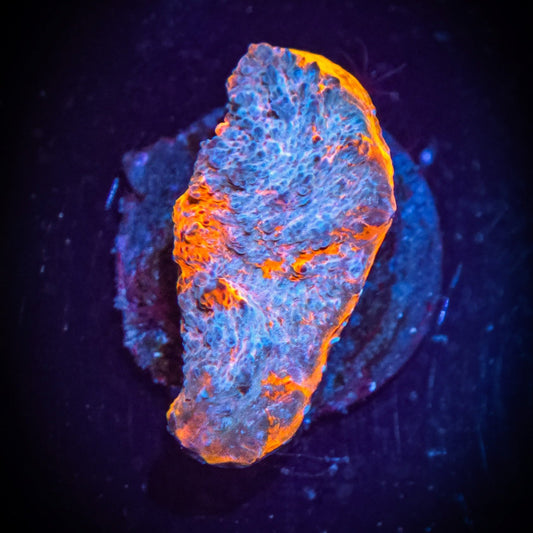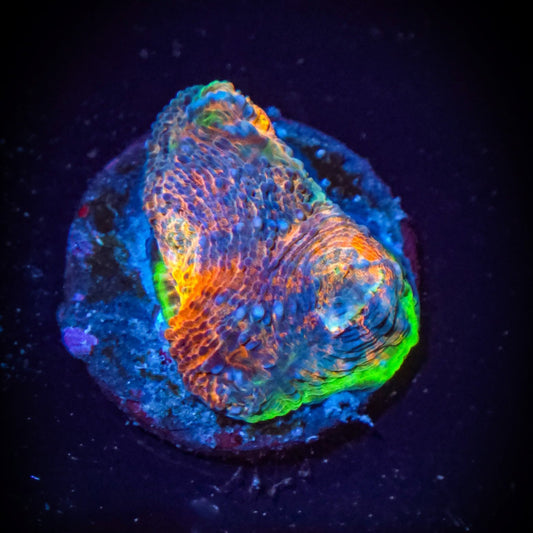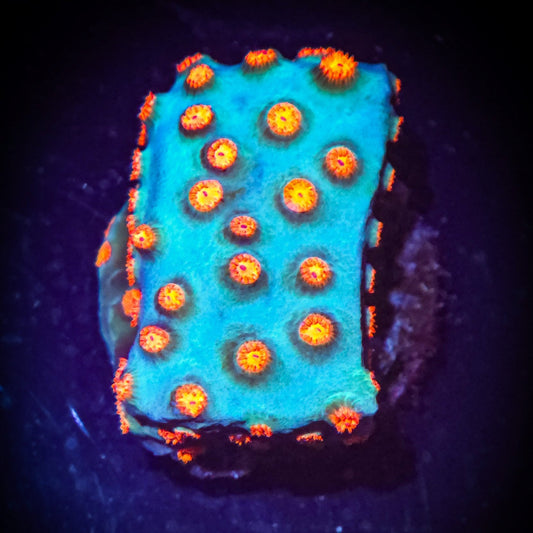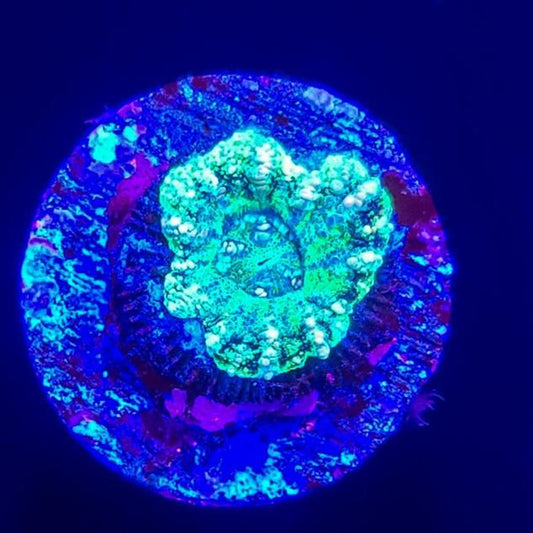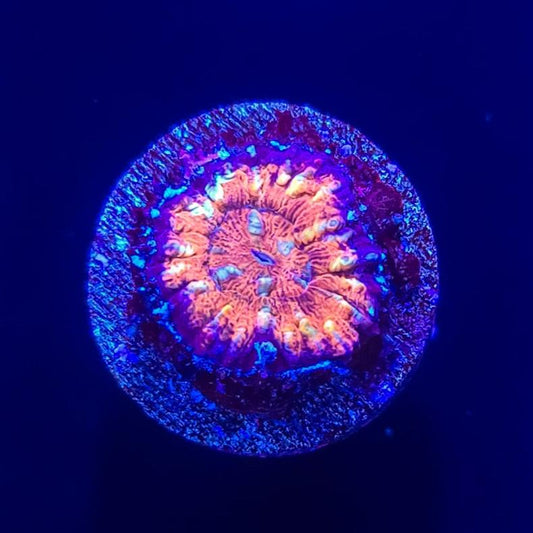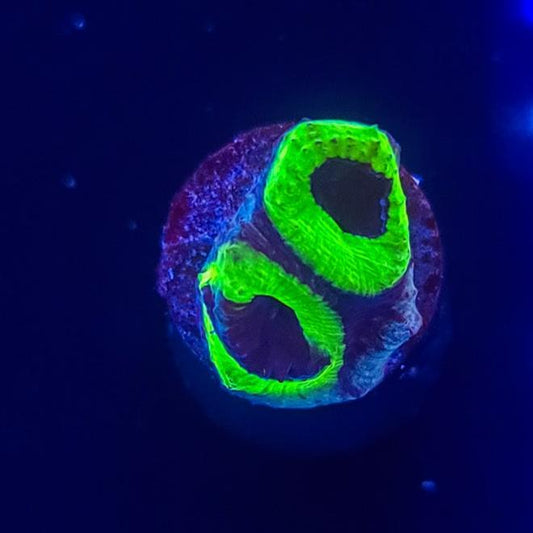Collection: LPS
Large Polyp Stony (LPS) corals represent some of the most spectacular and rewarding coral species available to reef aquarium enthusiasts. These magnificent corals combine the structural beauty of hard calcium carbonate skeletons with large, fleshy polyps that create stunning displays of color and movement. LPS corals are considered the perfect stepping stone between soft corals and the more demanding SPS varieties, offering moderate care requirements while delivering exceptional visual impact.
These diverse corals are ideal for intermediate aquarium hobbyists ready to explore the fascinating world of stony corals. Please browse all LPS coral varieties below, or contact our team online or by phone at 920-385-4802 to get started.
-
AC Red and Green Blasto
Regular price $24.99Regular priceUnit price / per -
Blue Raven Blasto
Regular price $34.99Regular priceUnit price / per -
AC Purple Blasto
Regular price $24.99Regular priceUnit price / per -
AC Cloudberry Chalice
Regular price $44.99Regular priceUnit price / per -
AC Ultra Red Bowerbanki
Regular price $74.99Regular priceUnit price / per -
AC Looney Tunes Stylocoeniella
Regular price $49.99Regular priceUnit price / per -
AC WWC Favia of the Gods
Regular price $84.99Regular priceUnit price / per -
AC WWC Bizarro Cyphastrea
Regular price $29.99Regular priceUnit price / per -
AC Raja Rampage Chalice
Regular price $34.99Regular priceUnit price / per -
AC Cherry Blossom Favia
Regular price $34.99Regular priceUnit price / per -
AC Tyree War and Peace Favia
Regular price $44.99Regular priceUnit price / per -
AC Electric Daisy Stylocoeniella
Regular price $19.99Regular priceUnit price / per -
AC Glowstick Chalice
Regular price $199.99Regular priceUnit price / per -
AC Rainbow Diaseris Plate
Regular price $499.99Regular priceUnit price / per -
AC Ultron Favia
Regular price $49.99Regular priceUnit price / per -
AC Sonic the Hedgehog Galaxea
Regular price $29.99Regular priceUnit price / per -
AC Angel Eye Favia
Regular price $44.99Regular priceUnit price / per -
AC Sherbert Favia
Regular price $74.99Regular priceUnit price / per -
AC Timewarp Echinata
Regular price $34.99Regular priceUnit price / per -
AC Tye Dye Echinata
Regular price $69.99Regular priceUnit price / per -
AC Meteor Shower Cyphastrea
Regular price $29.99Regular priceUnit price / per -
Scolymia: Green Button Scoly L82
Regular price $62.99Regular priceUnit price / per -
Scolymia: Button Scoly L82
Regular price $83.99Regular priceUnit price / per -
Favia: Prism Favia L32
Regular price $29.99Regular priceUnit price / per
What are LPS Coral?
Large Polyp Stony corals are characterized by their substantial calcium carbonate skeletons topped with prominent, fleshy polyps that can extend and retract based on lighting, current, and feeding conditions. These corals exhibit six-fold symmetry, meaning they have six tentacles or tentacles in multiples of six, and serve as important reef-building organisms in their natural habitats throughout the Indo-Pacific region.
LPS corals are generally considered easier to care for than their SPS counterparts, being more tolerant of fluctuations in water quality and temperature. Their larger polyps make them capable of capturing more nutrients from the water column and accepting direct feeding, which contributes to their hardiness and adaptability in aquarium settings.
Most LPS corals produce long sweeper tentacles which they use to keep other organisms at a safe distance and defend their territory. These aggressive feeding and defensive tentacles can extend several inches from the coral base, making proper spacing crucial when planning your reef layout.
LPS corals encompass an enormous variety of species, growth forms, and care requirements. Some varieties like Favites can grow very quickly while massive LPS like Scolymia can take years to grow an inch, demonstrating the incredible diversity within this coral category.
LPS Corals vs SPS Corals
Understanding the differences between Large Polyp Stony (LPS) and Small Polyp Stony (SPS) corals is essential for successful reef keeping, as these two categories have distinctly different care requirements and characteristics.
Polyp Size & Appearance
LPS corals have larger polyps typically between 1 and 2 inches in diameter, while SPS corals have small polyps with a diameter of less than 1cm. LPS corals have a thick, fleshy skeleton with more prominent polyps, while SPS corals have a thin, calcareous skeleton with smaller, more delicate polyps. The larger polyps of LPS corals make them easier to observe and often give them a more dramatic visual presence in the aquarium.
Care Requirements
LPS corals require less intense lighting and water flow than SPS corals, making them less demanding on equipment. SPS corals require strong lighting and strong water flow to thrive, while LPS corals can work under a wide range of lighting conditions depending on the species. SPS corals are more demanding when it comes to water conditions, requiring nitrates under 20ppm and phosphates less than 0.1, and most importantly requiring a very stable environment.
Feeding & Nutrition
LPS corals require more feeding and care than SPS corals, needing to be fed a variety of foods including plankton, brine shrimp, and other small organisms. Their larger polyps allow them to capture and consume larger food particles, making target feeding both possible and beneficial. SPS corals largely rely on photosynthesis for their nutrition, while LPS corals need suitable supplemental feedings to meet their nutritional demands.
Growth Rate & Structure
LPS corals generally grow at a slower rate than SPS corals due to their thicker skeleton and larger polyps, which require more energy to maintain. SPS corals tend to grow faster than LPS coral species, with some like bird's nest corals growing approximately 0.24 inches over four months.
Difficulty Level
LPS corals are generally considered easier to care for than SPS corals, making them ideal for beginner reef keepers who want to step up from soft corals. SPS corals are typically considered for "professionals" only because the water must be excellent and the monetary investment is higher compared to LPS corals.
Popular LPS Coral Varieties
Below are just some of the most popular LPS coral species that you'll find in the reefkeeping hobby. You'll find most, if not all of these on our website:
- Euphyllia Species (Hammer, Torch, Frogspawn, Octospawn): Euphyllia corals including Hammer, Torch, and Frogspawn are among the most popular LPS species, known for their flowing tentacles and graceful movement. These corals prefer moderate lighting and flow, and while they can be aggressive toward other coral species, they generally coexist peacefully with other Euphyllia varieties. Their swaying motion and diverse color morphs make them centerpiece corals in many reef displays.
- Blastomussa Species: Blastomussa corals are peaceful corals that don't require aggressive spacing and thrive under low to moderate lighting and flow. Blastomussa wellsi features larger, more fleshy polyps than Blastomussa merletti, with polyps commonly colored brown, green, or red. These hardy corals are ideal for tanks with varied conditions and are forgiving of water parameter fluctuations.
- Goniopora Species (Flowerpot Coral): Goniopora corals, commonly known as "Flowerpot Coral," have extended flower-like polyps in colors like pink, purple, or green. While not usually brightly colored, their delicate tentacles waving in the current can look quite attractive, though long-term success can be difficult. Goniopora polyps have 24 tentacles per polyp, distinguishing them from the similar Alveopora which have only 12.
- Brain Coral Species (Favia/Favites): Favia corals have many common names including Honeycomb Coral, Moon Coral, Pineapple Coral, Brain Coral, and Star Coral. These corals are easy to care for and prefer moderate light and flow. They have stinging sweeper tentacles and are aggressive, requiring lots of space around them.
- Chalice Corals (Echinophyllia, Echinopora, Mycedium, Oxypora): Chalice corals are a group of large polyp stony cup corals composed of several different genera with uniquely textured and colorful appearances. These corals prefer moderate lighting and flow, and like many LPS species, they have stinging tentacles that emerge at night, requiring adequate spacing from neighboring corals.
- Plate Corals (Fungia): Plate corals can be found with both long and short tentacles and come in various colors like green, orange, and purple. Long tentacled plate corals are fairly hardy and do well under moderate to bright lighting, but should be placed on the sand bed rather than on rockwork.
- Bubble Coral (Plerogyra sinuosa): Bubble coral is popular for its large exotic bulbous-shaped polyps that bunch together like a pile of bubbles, completely covering their corallites. These corals require gentle flow and moderate lighting, and their unique appearance makes them striking additions to reef displays.
Caring for LPS Coral
To ensure the best results for your LPS coral, you'll need to test your tank's water often to ensure the parameters are within the correct range.
Low to moderate water flow that provides gentle movement without overwhelming the fleshy polyps. Many LPS species are from deeper, slower moving water that is sometimes turbid, requiring low-to-moderate lighting and flow. Excessive flow can damage delicate polyp tissue and prevent proper feeding behavior.
LPS corals require careful placement with adequate spacing due to their aggressive sweeper tentacles. Most LPS corals produce long sweeper tentacles which they use to keep other organisms at a safe distance, requiring sufficient space between LPS and other corals. Many LPS species have long sweeper (stinging) tentacles and will battle with neighbors that are too close.
Plan for significant buffer zones around each specimen, especially at night when sweeper tentacles extend furthest. Some LPS species can coexist when touching, but research individual species compatibility before close placement. Also, you should avoid fish species known for nipping corals and ensure all tank inhabitants are reef-safe to prevent damage to expensive LPS specimens.
LPS corals are sometimes capable of feeding directly on meaty foods, with their larger polyps making feeding easier compared to SPS corals. LPS corals benefit from pellet or powder form foods, and when feeding it's important to reduce water flow so corals can easily catch prey.
Target feeding with meaty foods like mysis shrimp, brine shrimp, chopped seafood, and specialized coral foods will promote growth and enhance coloration. Feed 2-3 times per week when polyps are extended, using a turkey baster or feeding tool to deliver food directly to individual polyps.
With proper care, LPS corals become the living sculptures and focal points of any reef aquarium, providing movement, color, and structural diversity that creates captivating underwater landscapes. These corals reward patient hobbyists with steady growth, stunning displays, and the satisfaction of successfully maintaining some of nature's most beautiful marine organisms.
Get Started with LPS Coral Today!
At Sanctuary Aquatics, we've built specialized tank systems optimized for LPS coral cultivation, featuring appropriate lighting zones, gentle flow patterns, and carefully planned spacing that allows these magnificent corals to display their natural behaviors and stunning beauty.
We are dedicated to helping you succeed with your LPS coral care, so contact us and we can provide the help and resources you need to create a successful coral tank! Our systems include dedicated LPS-specific areas with optimal conditions for different species requirements, ensuring these remarkable corals receive the specialized care they need to thrive and maintain their spectacular growth patterns and coloration.
Contact our team online or by phone today at 920-385-4802 to see our LPS coral selection and get personal advice for your saltwater aquarium needs. As always, be sure to check out our full saltwater coral collection here to see all the species we have available!

